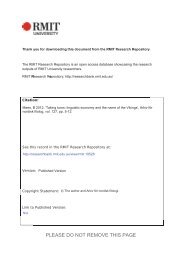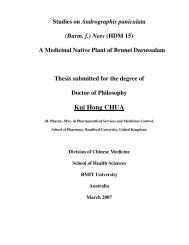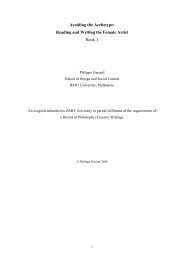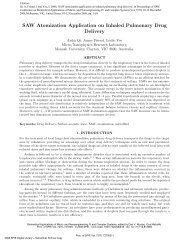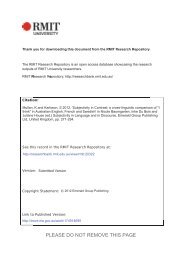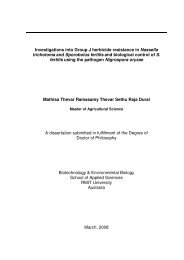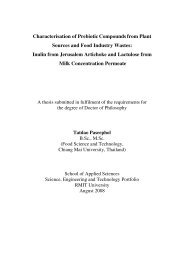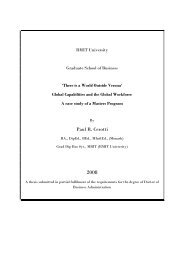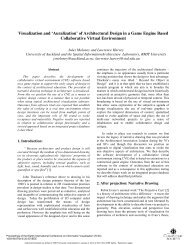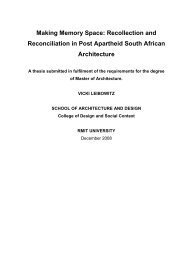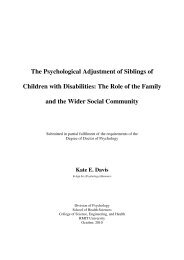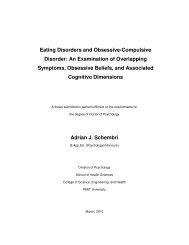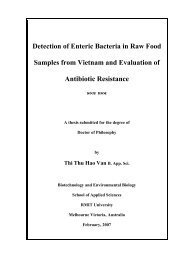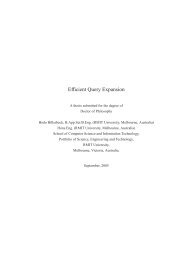Objects in Flux - RMIT Research Repository - RMIT University
Objects in Flux - RMIT Research Repository - RMIT University
Objects in Flux - RMIT Research Repository - RMIT University
You also want an ePaper? Increase the reach of your titles
YUMPU automatically turns print PDFs into web optimized ePapers that Google loves.
<strong>Objects</strong> <strong>in</strong> <strong>Flux</strong><br />
9/ Power tool drag rac<strong>in</strong>g is a compet-<br />
itive sport <strong>in</strong> which participants race<br />
modified consumer power tools (often<br />
belt sanders), http://www.powertool-<br />
dragraces.com/ accessed 12 Febru-<br />
ary 2010; see also ‘SCREEN GRAB, A<br />
Sport for Purists: Belt-Sander Races’<br />
(Pollak, 2000).<br />
10/ Vacuum cleaner modifications are<br />
often centred around robotic vacuum<br />
cleaners such as the Roomba from<br />
iRobot Corp (Robischon, 2007).<br />
11/ Public meet<strong>in</strong>gs range from the<br />
<strong>in</strong>dustry led Black Hat conference to<br />
the community organised DEF CON<br />
convention, http://www.blackhat.<br />
com/<strong>in</strong>dex.html accessed 14 March<br />
2010; http://www.defcon.org/ ac-<br />
cessed 14 March 2010.<br />
12/ Similar efforts by prom<strong>in</strong>ent fig-<br />
ures <strong>in</strong> the American hot-rod commu-<br />
nity sought to distance car customisa-<br />
tion from the socially maligned illegal<br />
street rac<strong>in</strong>g (Lucsko, 1998).<br />
56<br />
hackers at MIT persistently challenged university systems, particularly<br />
when these systems were designed to prevent access to <strong>in</strong>formation<br />
or equipment: ‘to a hacker, a closed door is an <strong>in</strong>sult, and a locked<br />
door is an outrage. Just as <strong>in</strong>formation should be clearly and elegantly<br />
transported with<strong>in</strong> a computer, and just as software should be freely<br />
dissem<strong>in</strong>ated, hackers believed people should be allowed access to<br />
files or tools which might promote the hacker quest to f<strong>in</strong>d out and improve<br />
the way the world works. When a hacker needed someth<strong>in</strong>g to<br />
help him create, explore, or fix, he did not bother with such ridiculous<br />
concepts as property rights’ (1984).<br />
From this account it is clear that ‘hack<strong>in</strong>g’ and ‘crack<strong>in</strong>g’ share similar<br />
processes, if not a common ethical framework. Further complicat<strong>in</strong>g<br />
matters, the ‘adolescent males’ whom Raymond seeks to def<strong>in</strong>e as<br />
‘crackers’ typically use the terms ‘hacker’ and ‘hack<strong>in</strong>g’ to describe<br />
who they are and what they do. In addition, the practice of crack<strong>in</strong>g/<br />
hack<strong>in</strong>g is not solely the doma<strong>in</strong> of adolescent males; it is a multi-faceted<br />
activity with prom<strong>in</strong>ent social and commercial dimensions. This<br />
diversity of practice is evident <strong>in</strong> the numerous public conventions<br />
organised around the crack<strong>in</strong>g/hack<strong>in</strong>g theme. 11<br />
The dist<strong>in</strong>ction Raymond and Stallman endeavour to make between<br />
‘hack<strong>in</strong>g’ and ‘crack<strong>in</strong>g’ can be seen as an attempt to distance hack<strong>in</strong>g<br />
from the public hysteria that generally surrounds acts of computer<br />
trespass. 12 In discuss<strong>in</strong>g such hysteria Andrew Ross claims that<br />
hackers have been ‘categorized as “enemies of the state” <strong>in</strong> order to<br />
help rationalize a general law-and-order clampdown on free and open<br />
<strong>in</strong>formation exchange’ (2000, p. 254). Ross states that position<strong>in</strong>g<br />
hack<strong>in</strong>g as a ‘social menace’ ‘is central to the ongo<strong>in</strong>g attempts to<br />
rewrite property law <strong>in</strong> order to conta<strong>in</strong> the effects of the new <strong>in</strong>formation<br />
technologies that … have transformed the way <strong>in</strong> which modern<br />
power is exercised and ma<strong>in</strong>ta<strong>in</strong>ed’ (2000, p. 254).<br />
Ross’s claims are particularly significant when we consider hack<strong>in</strong>g’s<br />
connection to the Free and Open Source Software (FOSS) movement.<br />
Although hack<strong>in</strong>g pre-dates FOSS by more than a decade, these two<br />
practices are strongly <strong>in</strong>tertw<strong>in</strong>ed. Raymond goes as far as stat<strong>in</strong>g that<br />
‘Today, “the hacker community” and “open-source developers” are<br />
two descriptions for what is essentially the same culture and popula-



